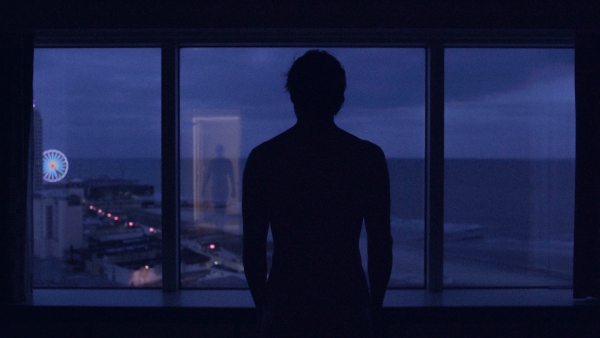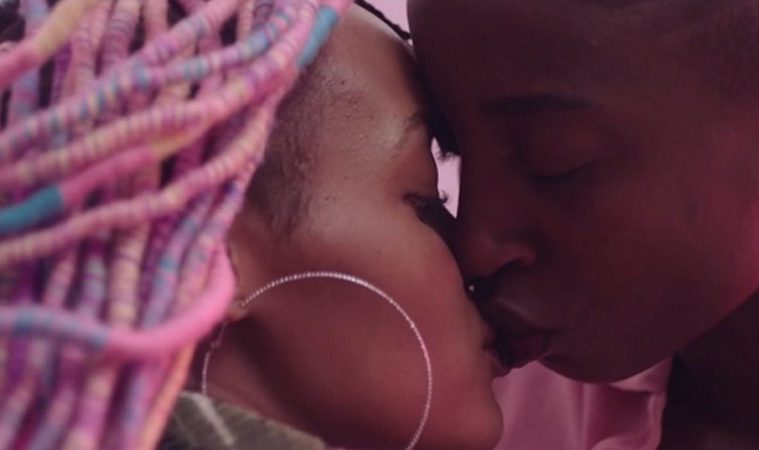
NewFest kicks off on Wednesday, celebrating the 30th year of New York City’s premier queer film festival. Each year, NewFest presents some of the buzziest titles from all over the world, but it also plays home to brand-new fiction films and documentaries that you can’t see anywhere else.
International titles with strong acclaim are some of the best films in this year’s slate, many making their NYC debuts: the Kenyan lesbian love story Rafiki, which premiered at Cannes, is the festival’s International Centerpiece; Mario from the Locarno Film Festival; and Hard Paint from the Berlin Film Festival. Yen Tan’s critically acclaimed AIDS drama 1985 starring Cory Michael Smith will open the festival, followed by Joel Edgerton’s Boy Erased as the U.S. Centerpiece. NewFest closes out with Making Montgomery Clift, directed by the actor’s nephew Robert Anderson Clift and Hillary Demmon.
We selected 10 titles among the dozens of excellent projects at this year’s festival. A 20th anniversary screening of the Angelina Jolie-starring Gia and 10th anniversary screening of Gus Van Sant’s Milk are also cineaste highlights. NewFest runs from October 24-30, and you can check out the slate right here.
1985 (Yen Tan)

Adrian (played with heartbreaking sensitivity by Cory Michael Smith) is coming back to his small Texas hometown for the first time in three years. He’s brought Christmas presents for his conservative parents (an extraordinary Virginia Madsen and Michael Chiklis) and his little brother who keeps his stash of Madonna tapes hidden, but he also comes with a couple of secrets: he’s been living as an out gay man in NYC, and he’s HIV positive. Set in the title year, director Tan’s attention to detail makes the festival’s Opening Night Film a treasure trove of 80’s nostalgia. But in many ways, the film itself (shot in grainy 16mm) also feels like a relic from the era. With characters painted like archetypes rather than people, and life lessons imparted that you can see coming a mile away, it’s more after school special than poetry. – Jose Solís
Daddy (Jonah Greenstein)

In his directorial debut, Jonah Greenstein takes on the sad reality of homelessness in New York by focusing on a young man (Alexander Horner) who survives in the city by sleeping in the homes of the “daddies” he meets on Grindr. Almost every scene shows him showing up at the apartment of a different man, most of whom fetishize his youth to the point where he seems more like a sex toy than a human being. That is until he meets William (the always remarkable Thomas Jay Ryan) who seems to see the young man for who he is, rather than what he wants from him. Greenstein has a keen eye for capturing the many ways in which people become invisible in NYC, and through subtle cues (a TV set is blasting a live report on the 2016 election) he shows the ways in which an intimate encounter with a stranger can make all the difference. – Jose Solís
Hard Paint (Filipe Matzembacher and Marcio Reolon)

You wouldn’t expect a film about a glowed up camboy to tackle social repression, bullying, and the internet’s ability to erase class boundaries through the avatars at our fingertips, but Hard Paint does so with a keen eye. Like directors Filipe Matzembacher and Marcio Reolon’s previous films, Hard Paint–which won the Teddy Award for Best Feature Film at this year’s Berlin Film Festival–is based in Porto Alegre in southern Brazil. Pedro (Shico Menegat) is a teen, socially ostracized by his community for defending himself against daily bullying. Seeking an outlet from his restricted reality, Pedro transforms himself into NeonBoy, a cam model performing with neon paints and earning his living from private performances. When a competitor steals Pedro’s neon schtick, he has to find a creative solution for maintaining his livelihood. Pedro’s neon sexual performances and real-life encounters shine a light from the chromatic edges of civil society on boundary-less networks of internet communities. – Joshua Encinias
I Hate New York (Gustavo Sánchez)

Director Gustavo Sánchez followed four transgender performer-activists over ten years in New York City, resulting in a title proclaimed by many: I Hate New York. The J.A. Bayona-produced documentary profiles Amanda Lepore, Chloe Dzubilo, Sophia Lamar, and T De Long, who inherited the infamous club and art scenes that integrated with the broader culture–or their culture disintegrated, depending how you look at it–after 9/11. A musical structure replaces a traditional visual beat of beginning, middle, and end. With the audacity of Godard’s audio editing, composer Ryūichi Sakamoto weaves the women’s stories together as a testament to their cultural interregnum in the early 2000s. – Joshua Encinias
The Heiresses (Marcelo Martinessi)

After being together for three decades, Chela (Ana Brun) and Chiquita (Margarita Irún) are about to face their first significant time apart when Chiquita is sent to prison for fraud charges. Having lost all their wealth, and even being forced to sell the possessions they inherited from their families, Chela suddenly finds herself becoming a cab driver for the rich ladies in her neighborhood. In his feature directorial debut, Martinessi crafts a singular portrait of being a woman in Latin America, and the way in which class comes into play to the extent that if you’re rich enough, no one will question the gender of the partner you choose to spend your life with. Brun and Irún are true forces of nature as women who refuse to kneel in the face of disaster, with Brun in particular displaying an emotional inner life that allows viewers to almost literally see her become someone else in front of their eyes. – Jose Solís
Making Montgomery Clift (Robert Anderson Clift and Hillary Demmon)

Making Montgomery Clift makes a compelling case for an alternative to the accepted history of Montgomery Clift self-destructive gayngst. Made by Robert Clift (nephew of Montgomery) and Hillary Demmon, they analyze family archives, including phone calls between Montgomery and his brother, recorded for posterity. Robert acts as the on-screen, documentarian gumshoe, like a minister presiding over an exhumation and reburial of his long-deceased uncle’s legacy. At times the documentary glosses over the substance abuse that lead to Clift’s early death, but its analysis is worth considering. For instance, by infamously refusing to sign studio contracts, he was considered a diva about town, but it also allowed him to forgo the kind of sham marriages studios foisted on gay stars like Rock Hudson. One wonders if the evidence provided in the documentary warrants reconsideration of Clift’s legacy as a tragic homosexual, or if it says something about the family’s uneasiness with that legacy. – Joshua Encinias
Mario (Marcel Gisler)

Following the basic plot of Francis Lee’s God’s Own Country but set in the world of soccer, Mario’s sexually repressed titular character, played by Max Hubacher, has plans for a fantastic soccer career. These become threatened by Leon Saldo (Aaron Altaras), a dark-haired and sexually open teammate from Germany. The two stumble into love only to have it threatened by the unwritten, homophobic rules held by their soccer club. The film highlights there are no openly gay players in Premier League. More importantly, Mario’s lived-in characters take the film beyond its tropes with broad humanistic appeal. Hubacher won the Swiss Film Award for best actor for the 71st Locarno Film Festival selection. – Joshua Encinias
Rafiki (Wanuri Kahiu)

Love stories rarely come with the vibrancy and swoon-worthiness of Wanuri Kahiu’s Rafiki. Set in modern day Nairobi, we meet Ziki (Sheila Munyiva) the pink-haired “perfect Kenyan girl,” and the tomboyish Kena (Samantha Mugatsia) who fall in love despite their fathers being political rivals, and homosexuality being taboo in their country. Kahiu paints a portrait of a country caught in the middle of unrelenting change, where spiritual leaders can no longer provide the comfort young people need to satiate their innermost longings, and where forbidden love must seek secret places in which to thrive. Despite having many moments of tragedy and loss, the film is remarkable for its liveliness. It embodies the youthful spirit of its protagonists to show that, and as corny as it may sound, love is always meant to win. Banned in Kenya for depicting a lesbian relationship in a positive manner, Rafiki is political cinema that truly inspires. – Jose Solís
Retablo (Álvaro Delgado-Aparicio L.)

Fresh of a successful bow at this year’s Berlin Film Festival, Álvaro Delgado-Aparicio L.’s directorial debut is a worldview-shattering welcome into adulthood for fourteen-year-old Segundo (Junior Béjar Roca). The film follows a rift between Segundo and his artisan father Noe (Amiel Cayo), who creates story boxes that earn him the title of “maestro” in their Peruvian community. Noe is the paragon of manhood in their male-dominated community, but when Segundo encounters his father having sex with another man, he loses the ability to calibrate the man he’s expected to become, with the man his father is, and his own burgeoning sexuality. – Joshua Encinias
The Skin of the Teeth (Matthew Wollin)

Josef (Pascal Arquimedes) arrives at the apartment of his hedge fund manager date, the much older John (Donal Brophy), and is instantly impressed by the simple opulence: the steak dinner, the wine, the music and the view. Things go out of hand when the young man, who assumes a rich dude ought to have the best drugs, takes a pill he finds in John’s bedroom, and wakes up in an interrogation room where the very essence of his being is questioned. Even though the film is never as clever as it thinks (the ending seems like it’s meant to “shock” rather than the bring the story to a rightful conclusion) there is a lot to enjoy, especially in the earlier seduction scenes which brim with sensuality and playfulness but sadly fail to bring to surface how class and racial dynamics play out in gay dating. Now that’s a mystery worth cracking. – Jose Solís
The 30 edition of NewFest runs from October 24-30. See the lineup here.

